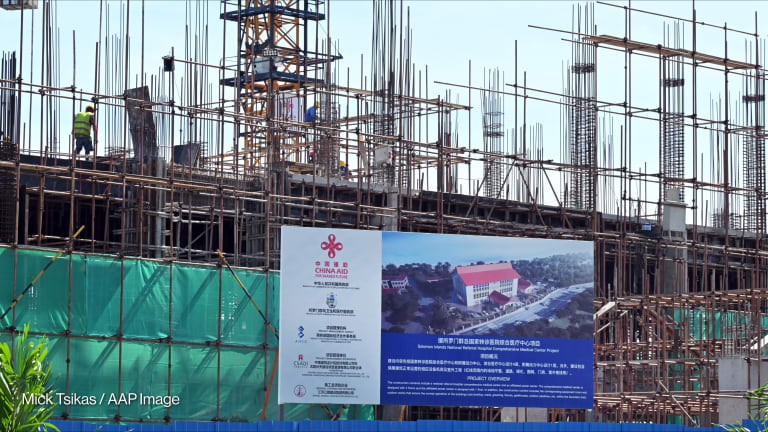
Since its launch in 2013, China’s massive Belt and Road Initiative has become a highly talked-about global development initiative. We have estimated that China has so far committed over $600 billion under BRI, which now encompasses some 133 countries.
It is not surprising, therefore, that there are almost daily press stories about it, and numerous summits and meetings around the world have been convened to discuss it. Yet most of the current discourse, much of it critical of BRI, is limited to geopolitics; many of the initiative’s key economic aspects remain unexplored. And hardly any studies take into account the views of independent experts within BRI countries rather than what outsiders think.
For Pro subscribers: Q&A: The 'intellectual father' of BRI on China's global development approach
Devex Editor-in-Chief Raj Kumar sits down for a wide-ranging discussion with Justin Yifu Lin — one of the most influential thinkers in China on global development described as the "intellectual father" of the Belt and Road Initiative.
To fill this glaring gap, we studied BRI as it affects eight countries in Central Asia and the South Caucasus region, where it is widely considered to be a potential economic gamechanger for this mainly landlocked region. Our work takes a deeper “inside-out” look at BRI from the perspective of these eight CASC countries.
So, what did we find that is different than the headlines that we read daily?
The answer is that while some of the criticism is indeed valid, the actual situation is much more nuanced: overall, most countries welcome this Chinese initiative, particularly large countries with good domestic institutional capacities such as Kazakhstan and Uzbekistan. The countries view this massive Chinese initiative as a unique opportunity to improve their competitiveness, attract needed foreign investment, diversify their economies, upgrade their physical infrastructure, enhance their trade flows, increase their fiscal revenues and — as a result of the foregoing — accelerate their economic development and improve their citizens’ standard of living.
Yet embracing BRI is not without risks. Largely financed by loans from China, BRI investments may prove to be fiscally unsustainable for some recipient countries. This risk is heightened by often inadequate ex-ante assessment of BRI projects’ economic and financial viability and their social and environmental impacts. Moreover, without coordinated infrastructure investment planning or proper maintenance of new assets, some BRI projects could end up being wasteful or redundant. These pitfalls must be proactively addressed through policy and institutional reforms in the recipient countries.
Such reforms have to be undertaken at the national and regional levels. At the national level, for example, proposed BRI projects must be integrated into national plans and priorities, and their economic and financial viability assessed ex-ante. Soft infrastructure developments — transit and trade facilitation, operations and maintenance, sector policy reform and institutional capacity building — need to be pursued in tandem with physical infrastructure developments. And greater transparency in procurement and more attention to the implementation of projects must be a guiding principle.
At the regional level, economic cooperation must be deepened and accelerated in order for all countries to enjoy the benefits of greater connectivity with neighboring and world markets, mitigate negative spillover effects and conduct a joint dialogue with China.
This brings us to the role of China. There are signs that Chinese policymakers are rethinking their approach to BRI. They are learning from experience gleaned during the first six years of this initiative, but also appear to be listening to the concerns expressed by the international community. Most of all, China seems increasingly concerned about recovering the billions of dollars it has lent to countries with fragile balance sheets.
Whatever the motives, at the Second Belt and Road Forum held in Beijing this April, Chinese leaders announced major improvements in BRI, including: analysis of BRI countries’ debt sustainability in cooperation with IMF; mandatory, rigorous economic and financial analysis of all BRI projects; greening of the BRI; zero tolerance of corruption; and multilateralization of BRI through cooperation with 10 international organizations. If and when fully implemented, these reforms could potentially address most of the issues identified by us.
BRI has the potential to transform the entire Eurasia landmass. To realize this historic initiative’s promise and avoid its potential pitfalls, BRI’s recipient countries must work with the global development community and China. But ultimately, these efforts to improve BRI will bear few fruits and will be heavily dependent on China’s ability to implement changes announced at the second BRI forum earlier this year.
This will benefit not only all 133 BRI countries, but also preserve hundreds of billions of dollars of savings of over 1.35 billion Chinese people that are being invested overseas.











